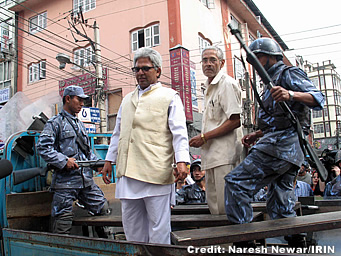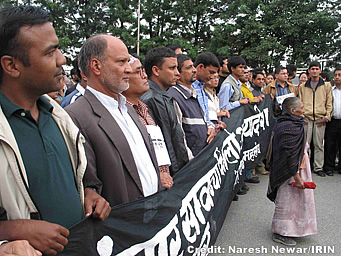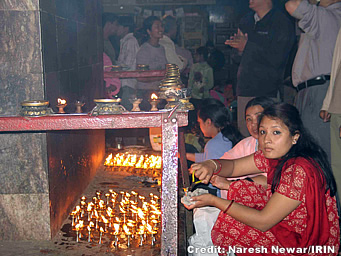 |
 |
| Press Freedom & Freedom of Expression |
|
|
|
 |
|
|
| National strike leads to mass arrests |
KATHMANDU, 6 Apr 2006 (IRIN)
 |
|
More than 1,000 demonstrators were arrested across Nepal, with nearly 450 taken into custody alone in the capital, according to the country's second largest political party, Unified Marxist Leninist (UML).
Even commuters and shoppers who were not participating in the political rallies were subject to arbitrary arrest, opposition groups have said.
Reports suggest the strike was largely observed throughout Nepal with businesses and schools shut down and public and private vehicles staying off the roads. Many Nepalese supported the national strike out of fear of reprisals from rebels rather than an expression of discontent with the status quo, some local people who spoke to IRIN, said.
According to one of the country's key rights NGOs, the Centre for Victims of Torture (CVICT), the police used unnecessary violence while making arrests. CVICT's workers said that the organisation alone treated around 30 people injured while being arrested during marches in the capital.
Arrests in the capital have escalated since Tuesday when the government banned large gatherings and demonstrations. Despite the ban, another large demonstration is planned for Saturday in Kathmandu.
A statement by the UML party today said that two of its party activists have already died from severe injuries during their arrests in the cities outside the capital.
Hours
ahead of the strike, Maoist rebels, who have waged a decade-long campaign
to turn Nepal into a communist republic, struck at security forces in the
south of the country.
Police
say the rebels bombed government buildings and fired at security posts
in the district town of Malangawa.
Several policemen and rebels were killed in the ensuing fighting. The rebels also claimed responsibility for shooting down a military helicopter.
The United Nations has condemned the violence that appears set to worsen as the strike continues. "While maintenance of law and order is the responsibility of the state, security considerations should not be the basis for denying citizens their right to peaceful protest - a right for which virtually all avenues seem to be closing," UN Secretary-General Kofi Annan said in a statement released on Wednesday.
| The United Nations has condemned the violence |
| KATHMANDU, 6 Apr 2006 (IRIN) |
SECRETARY-GENERAL CONCERNED BY CONFRONTATION DEVELOPING IN NEPAL , APPEALS TO ALL SIDES TO WORK TO END CONFLICT THROUGH RECIPROCAL CEASEFIRE
The following statement was issued today by the Spokesman for UN Secretary-General Kofi Annan:
The Secretary-General is concerned about the confrontation developing in Nepal, where the Government has imposed a ban on protests in Kathmandu on the eve of planned demonstrations by the Seven-Party Alliance. He is also troubled by reports of a large number of arrests of government opponents. While maintenance of law and order is the responsibility of the State, security considerations should not be the basis for denying citizens their right to peaceful protest -- a right for which virtually all avenues seem to be closing.
In the context of stated security considerations, the Secretary-General notes the recent announcement by the Communist Party of Nepal (Maoist) that it has suspended military activity in the Kathmandu Valley. He urges the Maoists to take further steps to fulfil the commitments they have publicly made.
The Secretary-General appeals to all sides in Nepal to work towards ending the conflict through a reciprocal ceasefire agreement.
| Concern over increasing risks faced by journalists |
| DHADING, 10 Apr 2006 (IRIN) |
 |
|
"This is my passion and I will continue working as a journalist no matter what the hardship," said Adhikary, who barely makes US $75 a month from his reporting job at a national daily newspaper.
Adhikary is often literally caught in the violent clashes between the rebel militants and Royal Nepalese Army (RNA) soldiers. He has to be extra cautious especially while reporting the abuses at their hands against local civilians, whose vulnerability is increasing every day due to the number of military clashes in populated areas.
"The mental torture is a daily routine for the journalists," explained Adhikary, who is often interrogated by local administration and security officials to reveal the sources of his information on the whereabouts of the rebels and their activities.
At the same time, the rebels are putting the lives of journalists at risk, with neither side in the conflict allowing independent reporting.
The situation has now drawn criticism from international journalists who have expressed serious concerns over the increasing risks that Nepalese reporters are experiencing on a day-to-day basis.
An international mission to Nepal on 20 March by 12 renowned global media organisations noted a number of cases of local journalists being harassed, intimidated, illegally detained, tortured and issues restrictive directives by the state.
"Of particular concern is the increasing involvement of the Royal Nepalese Army (RNA) and armed police forces in press freedom and freedom of expression violations, as well as interference in the media sphere," the mission said in a statement on 25 March.
But despite this concern, also reiterated by local and international human rights groups, abuses against the reporters continue, according to the Federation of Nepalese Journalists (FNJ).
The FNJ, which comprises of more than 5,000 Nepalese journalists and is actively engaged in fighting for press freedom, has come under immense pressure. It has been subject to threats by the state, especially since 1 February, 2005 when King Gyanendra assumed direct rule of the country. The king sacked the democratic government and introduced several royal media ordinances to control the country's vibrant independent press.
"The cases of injuries and arrests of journalists are increasing every day and state intimidation against journalists is beyond control," said FNJ President Bishnu Nisturi, who has lost count of how many times he has been arrested and detained by both the army and the police.
He further explained that journalists' physical security and safety are under threat from both the state and rebels.
Journalists came under threat again during the mass democratic rallies organised by the seven main opposition parties last week. Many were arrested, detained and physically manhandled for reporting on police brutality against the peaceful demonstrators. Since 5 April, around 102 were arrested in less than a week, according to the FNJ.
During the three days of curfew imposed by the state on Saturday,the Ministry of Communications refused to give curfew passes to journalists from several leading newspapers, consequently making them victims of police intimidation and arrests.
On Sunday, journalist Hari Gyawali was severely injured and hospitalised when he was battered by a group of armed police in Butwal city, 300 km west of Kathmandu, for failing to carry a curfew pass.
"We were shocked at the violence of the security forces whose beating fractured his arm," said local journalist Jai Bahadur Pun, who helped Gyawali to get to hospital.
On top of this, concern is growing about overnight detention of journalists in police stations, which remain prime targets for the Maoists. On Sunday, the rebels attacked Butwal's police station, where 18 journalists had been detained. The security forces fled the station leaving the journalists without any protection. Fortunately, none of them were injured but the situation left them traumatised.
"The journalists were shocked to hear some of the army soldiers saying that [they] could be human shields against the attack and that [their] lives meant nothing to them," explained Pun, infuriated at the cruel attitude of the soldiers. He also criticised the Maoist rebels for being indifferent to the safety of the journalists, about whose detention the rebels were fully aware.
"Both sides have been literally terrorising the journalists," said Pun.
| Millions of lives affected by daily curfews |
KATHMANDU, 9 Apr 2006 (IRIN)
We were shocked to witness police brutality against demonstrators," said prominent human rights activist Subodh Pyakhurel, who attended marches in the capital, Kathmandu.
 |
|
King Gyanendra seized absolute rule over the country on 1 February 2005, sacking then prime minister Sher Bahadur Deuba, for his alleged failure to curtail the decade-long Maoist insurrection; a conflict which has already taken over 13,000 lives.
Human rights activists are seriously concerned over the deteriorating security situation in the country mainly due to the government's use of excessive police force to thwart off the peaceful demonstrators.
In the last four days of democratic rallies, the number of demonstrators has been growing every day, even including the participation of also the government's own civil servants, according to daily reports in the leading local and international newspapers.
The government has also been mobilising more security personnel on the streets and now more police and army with guns are seen openly aiming their guns at the demonstrators, which is causing serious concern among human rights organisations.
According to Insec, over 100 demonstrators were seriously injured in the capital alone after the police fired tear gas shells and baton charged. It added that the police opened fire even at bystanders in the nearby town of Kirtipur, where eleven-year old Batu Krishna Thapa was severely wounded. In another incident, the security personnel were held responsible for the death of an innocent bystander, 32-year old Tulali Dumrakoti Chettri, who died of gun wounds on Sunday in Bharatpur town, 165 km south of Kathmandu.
With the number of fatal injuries among demonstrators rising due to the excessive force of the security personnel, the government clampdown has provoked severe criticism from citizens, international human rights groups and politicians.
"We are concerned over what was anticipated and what is going on," said Ian Martin, Nepal representative of the office of the United Nations High Commissioner for Human Rights (OHCHR), during a programme held in the capital on Sunday. Martin added that his office was deeply concerned over the ongoing action of the government to violate the citizen's human rights.
| Credit
IRIN 2006 Copyright © UN Office for the Coordination of Humanitarian Affairs 2006 [ This report does not necessarily reflect the views of the United Nations] Integrated Regional Information Networks (IRIN), part of the UN Office for the Coordination of Humanitarian Affairs (OCHA). |
| External links |
| IRIN News |
|
|
|
|
|
 |
|
|
